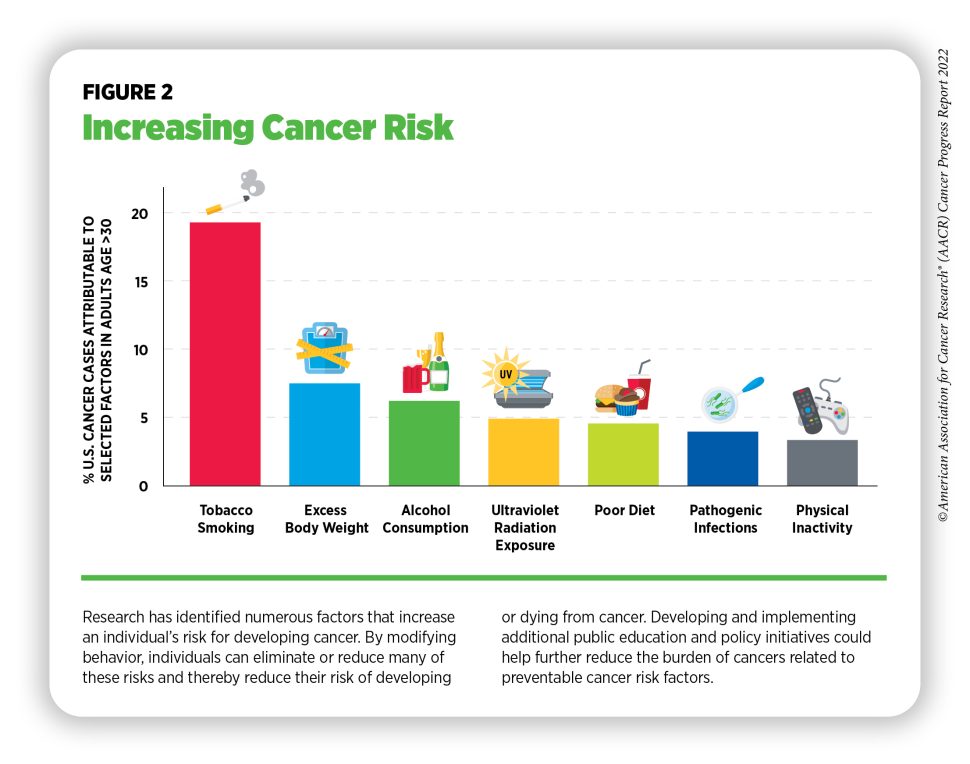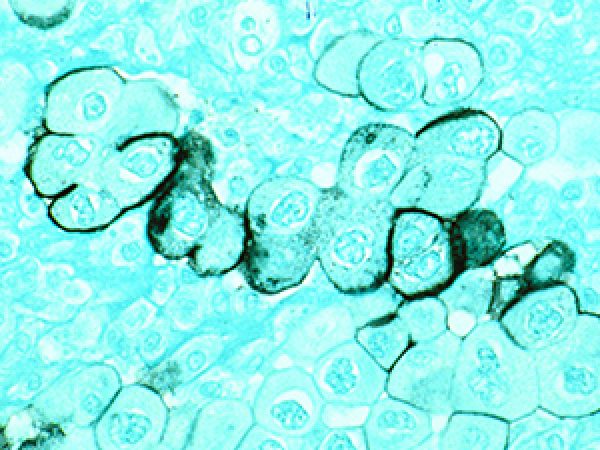How Do Diet and Exercise Help Prevent Cancer?
In the United States, about 40% of cancer cases are associated with preventable risk factors.
According to the AACR Cancer Progress Report 2022, 15 types of cancer have been linked to being overweight or obese, while several other types have been associated with physical inactivity.
Many people know what they should do to reduce cancer risk—maintain a healthy weight, get regular exercise, limit alcohol, and avoid tobacco. But it’s not always clear to the general public why or how these behaviors affect cancer risk.

Researchers have uncovered many of the mechanisms that explain why a change in diet or exercise might translate into a lower chance of developing cancer, or an improved prognosis following cancer treatment. Some of these mechanisms are highlighted in a recent collection of articles from the AACR journals. As we mark Cancer Prevention Month, these articles, focusing on diet, exercise, and lifestyle factors, are freely available.
Some key questions addressed in the collection:
Can a healthy lifestyle help reduce my risk of getting cancer?
This fundamental question was the focus of a study published in Cancer Research in September 2021. The study examined 442,501 individuals, categorizing them as having low or high risk of developing cancer, as assessed by a cancer polygenic risk score conducted for this study. The researchers evaluated the effects of five healthy behaviors: no current smoking, no alcohol consumption, regular physical activity, moderate body mass index, and a healthy diet pattern.
The study found that among men and women with a high genetic risk and an unfavorable lifestyle, the standardized five-year incident cancer rates were 7.23% for men and 5.77%, respectively. For those with a high genetic risk and a favorable lifestyle, the cancer rates were 5.51% for men and 3.69% for women.
The researchers also found that the more favorable behaviors a person exhibited, the lower their risk of developing cancer. For both the high-genetic risk groups and the low-genetic risk groups, cancer incidence was lowest for people who exhibited all five favorable behaviors, and highest for people who practiced one favorable behavior, or none.
The authors concluded that the “detrimental effect of genetic risk on incident cancer risk could be attenuated by adherence to a healthy lifestyle. These results indicate that public policies for improving food and physical environment, as well as relevant policies on tobacco control and alcohol restriction, are critical to reduce the burden of cancer in the general population.”
How does calorie restriction help prevent cancer?
Dieting may be a joyless experience, but research has shown that restricting calories can have a protective effect against cancer. A study published in Cancer Discovery in January 2022 assessed the value of “fasting-mimicking” diets, in which people severely restricted calories for short periods of time. In this first-in-human study, 101 patients with cancer completed up to eight cycles of a fasting-mimicking diet. Participants ate up to 600 calories on the first day of a cycle, then no more than 300 calories for the next four days. They then resumed normal eating habits for 16 to 23 days before resuming the cycle.
Lead author Claudio Vernieri, MD, PhD, of the National Cancer Institute of Milan, MD, PhD, found that the fasting-mimicking diet lowered levels of insulin-like growth factor-1 (IGF-1), which can stimulate cell growth and has been linked to breast cancer and thyroid cancer, among others.
A subgroup analysis of 38 patients showed increases in activated CD8 T cells and cytolytic natural killer cells, suggesting an immune response linked to better outcomes in cancer patients. Noting that this trial confirmed the safety of the diet and that participants showed a high degree of compliance, the researchers are planning phase II trials to study the diet in combination with chemotherapy and immunotherapy.
A cautionary note: Any highly restrictive diet should only be followed at the direction of a medical professional. “Without a nutritional evaluation by an oncology staff or by experts, or by nutritionists in cancer therapy, cancer patients proposing or self-prescribing a severe calorie restriction is highly risky,” Vernieri told Cancer Today, the AACR’s magazine for patients, survivors, and caregivers.
Why should I stay away from sugary beverages?
A study published in May 2021 in Cancer Epidemiology, Biomarkers & Prevention showed that breast cancer patients who drank five or more sugar-sweetened beverages per week had significantly greater risk of overall mortality and breast cancer-specific mortality in the study’s 18 years of follow-up. “High intake of sugar-sweetened soda, in the quantities consumed by many in the United States, has been associated with weight gain and high adiposity, both of which are well-established risk factors for cancers,” the authors pointed out. They explained that the high concentration of sugar in soda may affect the body’s glycemic response, leading to high blood sugar, impaired glucose tolerance, and higher circulating IGF-1 levels, all of which have been associated with breast cancer.
This study elucidated an important point in the dietary component of cancer prevention efforts: “High frequency of sugar-sweetened soda consumption is not an isolated feature of the diet, but is usually part of an unhealthy diet pattern,” the authors wrote. In other words, people who habitually drink sugary beverages may also eat insufficient amounts of fruits and vegetables and excessive amounts of processed foods. The authors attempted to control for other dietary factors, but the association between sugary drinks and worse outcomes from cancer remained consistent.




As a firm believer in the importance of preventive healthcare, I couldn’t agree more with the points made in this blog post. The impact of diet and exercise on cancer prevention cannot be emphasized enough. It is both fascinating and empowering to learn how simple lifestyle choices can play a significant role in reducing cancer risk.
Diet plays a crucial role in maintaining overall health and bolstering the body’s defense against cancer. By adopting a diet rich in fruits, vegetables, whole grains, and lean proteins, we provide our bodies with essential nutrients and antioxidants that combat free radicals and reduce oxidative stress. Additionally, limiting the intake of processed foods, sugary drinks, and unhealthy fats can prevent excessive weight gain, which is linked to an increased risk of various cancers.
This study elucidated an important point in the dietary component of cancer prevention efforts: “High frequency of sugar-sweetened soda consumption is not an isolated feature of the diet, but is usually part of an unhealthy diet pattern,” the authors wrote. In other words, people who habitually drink sugary beverages may also eat insufficient amounts of fruits and vegetables and excessive amounts of processed foods. The authors attempted to control for other dietary factors, but the association between sugary drinks and worse outcomes from cancer remained consistent.